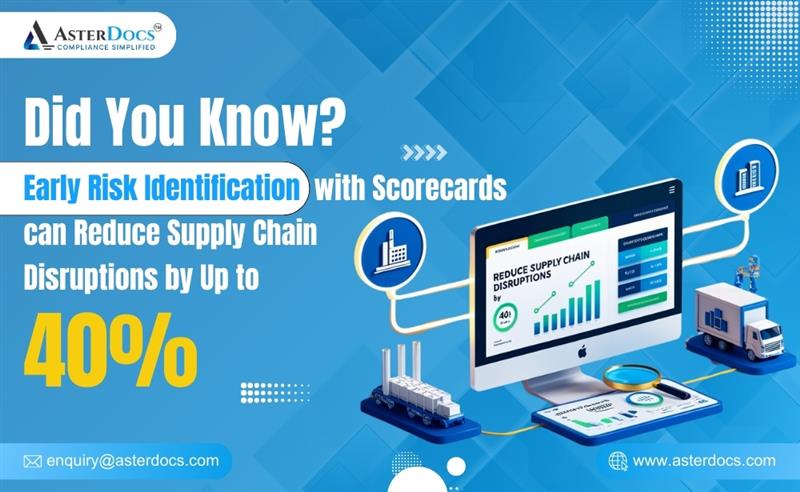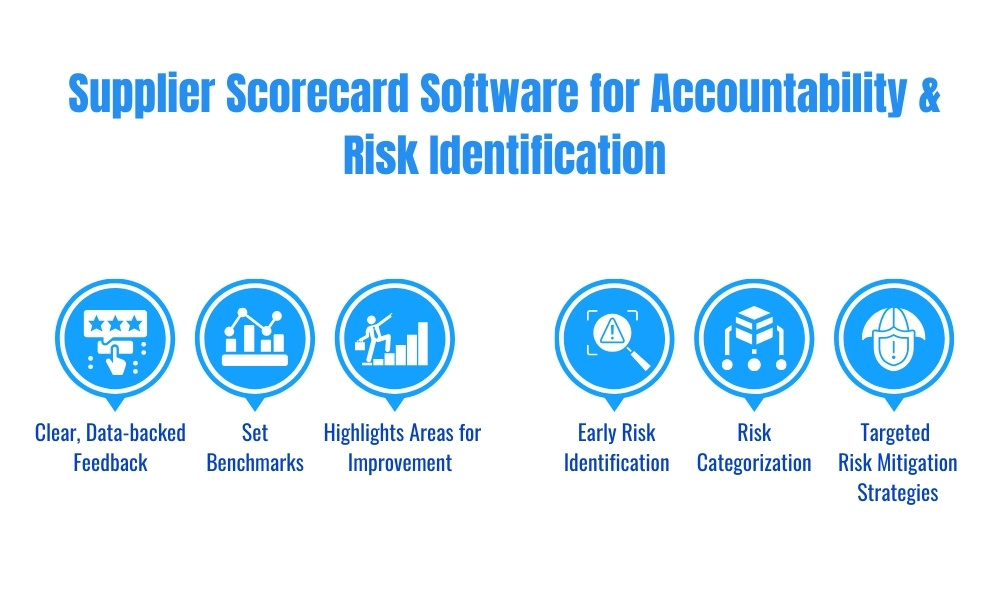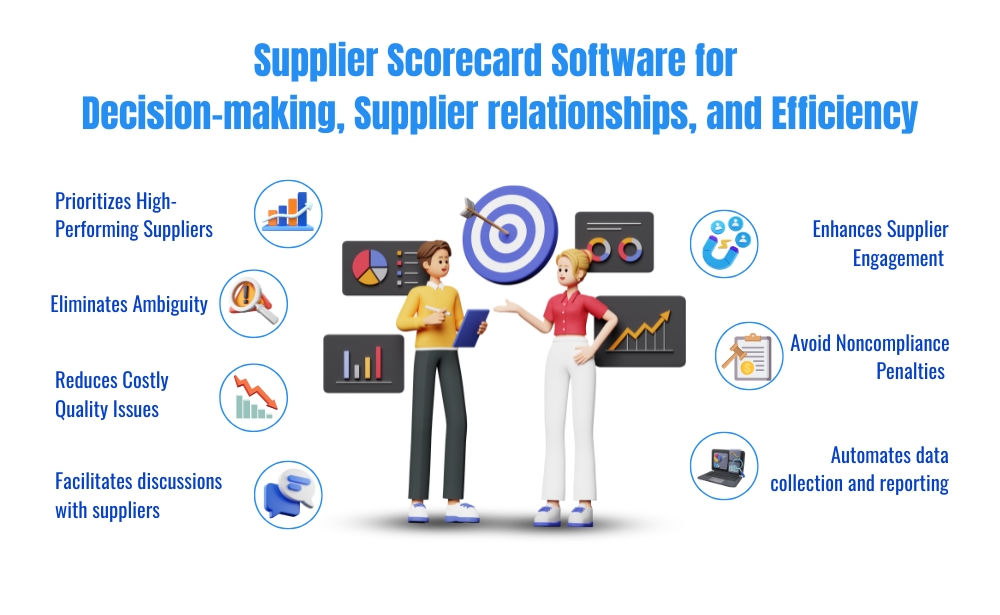In supply chain management, ensuring the quality and reliability of suppliers is critical. Supplier scorecard software provides a structured approach to assess, track, and manage supplier performance, making it a valuable tool in supply chain risk mitigation. By leveraging quality data and consistent metrics, businesses can make better decisions, identify risks early, and maintain strong relationships with suppliers.
In this blog, we will visually break down the core benefits of using supplier scorecard software.
Supplier Scorecard Software: An Essential Part of Modern Supplier Quality Management
Improved Supplier Accountability
Supplier scorecard software creates a transparent, data-driven framework for holding suppliers accountable. In any supply chain, accountability is key for maintaining quality standards and ensuring timely deliveries. Scorecards provide a clear view of supplier performance metrics, making it easy to track compliance with agreed-upon standards. When suppliers know they are being evaluated consistently, it encourages them to meet or exceed these standards, as they’re aware that their performance is being monitored in a structured, objective way.
How supplier scorecard software boosts accountability:
- Provides clear, data-backed feedback to suppliers on their performance.
- Highlights areas where suppliers may need improvement, allowing for proactive discussions.
- Encourages continuous improvement by setting measurable benchmarks and expectations.
By offering suppliers a concrete understanding of where they stand, scorecard software promotes a culture of accountability that strengthens the entire supply chain.
Enhanced Risk Identification and Mitigation
Risk management is a crucial component of supplier quality management. Supplier scorecard software enhances a business’s ability to identify and mitigate risks by providing a comprehensive view of each supplier’s performance. Scorecards help track potential issues, such as quality defects, late deliveries, or compliance lapses, allowing businesses to take preventive actions before problems escalate.
Key ways scorecard software aids in risk management:
- Enables early identification of high-risk suppliers by tracking performance trends.
- Supports categorization of risks based on different metrics, like quality and timeliness.
- Allows for targeted risk mitigation strategies tailored to specific supplier risks.
With these insights, companies can implement proactive solutions to avoid costly disruptions, protect their brand reputation, and maintain consistent quality in their products.
Better Decision-Making with Data-Driven Insights
Supplier scorecard software provides essential metrics that help businesses make informed, objective decisions. Traditional supplier management methods often rely on subjective assessments or inconsistent data, which can lead to poor decisions. By contrast, scorecard software centralizes and standardizes performance metrics, offering a reliable foundation for decision-making.
How data-driven insights empower better decisions:
- Metrics like quality, compliance, and delivery timeliness allow for a well-rounded view of each supplier.
- Scorecard data enables businesses to prioritize high-performing suppliers and address issues with lower performers.
- Facilitates objective discussions with suppliers, backed by concrete data rather than anecdotal feedback.
The value of these insights lies in their consistency and transparency. Businesses can use scorecard data to negotiate better terms, decide on contract renewals, or select suppliers for new projects—all with greater confidence and clarity.
Stronger Supplier Relationships through Transparency
Transparency is vital for building and maintaining strong supplier relationships. Supplier scorecard software fosters transparency by providing both parties—buyers and suppliers—with access to performance data. When suppliers understand how their performance is being measured and have visibility into the metrics, they are more likely to engage in open communication and be receptive to feedback.
Benefits of transparency in supplier relationships:
- Builds trust by eliminating ambiguity around performance expectations and assessments.
- Encourages open dialogue about challenges, fostering a collaborative approach to improvement.
- Enhances supplier engagement by involving them in performance management and quality initiatives.
With transparent scorecard metrics, businesses and suppliers can work together towards shared goals, making the relationship more productive and mutually beneficial. Suppliers are also more likely to take ownership of their performance, knowing that both sides are aligned on expectations.
Increased Operational Efficiency and Cost Savings
Efficiency and cost savings are among the most significant benefits of supplier scorecard software. By automating the tracking and assessment process, scorecard software reduces the time and resources needed for manual evaluations. Businesses can streamline supplier evaluations and eliminate redundant tasks, making supplier quality management a more efficient process.
How Scorecards Contribute to Efficiency and Savings:
- Automates data collection and reporting, freeing up valuable time for procurement teams.
- Reduces the likelihood of costly quality issues or delays by enabling proactive management.
- It helps avoid penalties and compliance-related expenses by keeping suppliers aligned with regulatory requirements.
In the long run, these efficiencies lead to substantial cost savings. With consistent supplier performance and fewer disruptions, businesses can allocate resources more strategically, ultimately contributing to a stronger bottom line.
Conclusion
Supplier scorecard software has become a must-have for effective supplier quality management. By promoting accountability, enhancing risk identification, supporting data-driven decisions, fostering transparency, and improving efficiency, scorecards provide a comprehensive approach to managing supplier relationships. When suppliers know they are held to consistent standards and have visibility into their performance, they are more likely to meet or exceed expectations, creating a more resilient and reliable supply chain.
For companies aiming to strengthen their supply chain and improve supplier performance, implementing supplier scorecard software is a strategic move. Consider exploring our resources on scorecard implementation to see how your business can benefit from these essential tools for supplier management.















